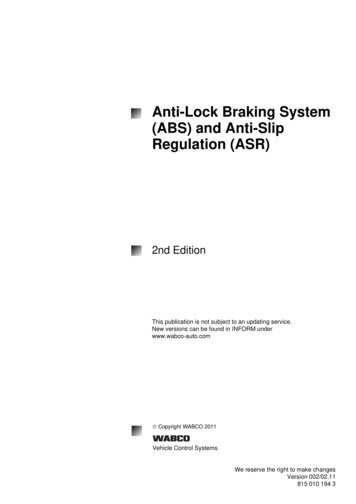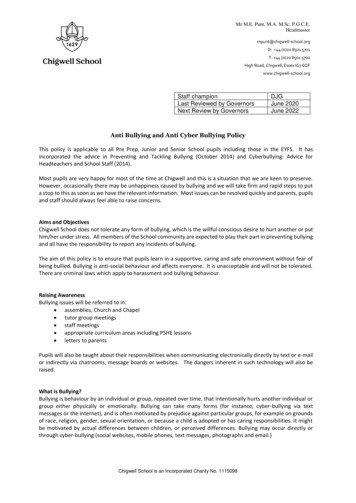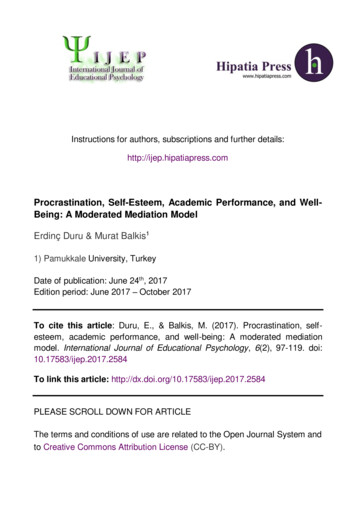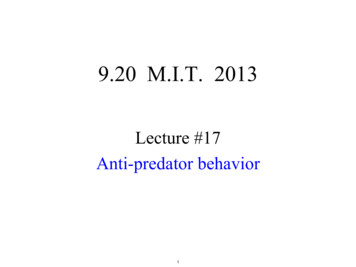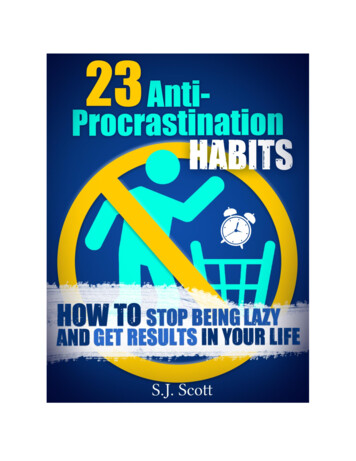
Transcription
23 ANTI-PROCRASTINATIONHABITSHow to Stop Being Lazy and Overcome YourProcrastinationBy: S.J.Scotthttp://www.HabitBooks.comFormatted byArchangel Ink
23 Anti-Procrastination Habits. Copyright 2015 by Oldtown Publishing LLCAll rights reserved. No part of this book may be reproduced in any form without permission inwriting from the author. Reviewers may quote brief passages in reviews.DisclaimerNo part of this publication may be reproduced or transmitted in any form or by any means,mechanical or electronic, including photocopying or recording, or by any information storageand retrieval system, or transmitted by email without permission in writing from the publisher.While all attempts have been made to verify the information provided in this publication, neitherthe author nor the publisher assumes any responsibility for errors, omissions, or contraryinterpretations of the subject matter herein.This book is for entertainment purposes only. The views expressed are those of the author alone,and should not be taken as expert instruction or commands. The reader is responsible for his orher own actions.Adherence to all applicable laws and regulations, including international, federal, state, and localgoverning professional licensing, business practices, advertising, and all other aspects of doingbusiness in the US, Canada, or any other jurisdiction is the sole responsibility of the purchaser orreader.Neither the author nor the publisher assumes any responsibility or liability whatsoever on thebehalf of the purchaser or reader of these materials.Any perceived slight of any individual or organization is purely unintentional.
Table of ContentsYour Free GiftAre You a Procrastinator?The Procrastination Habit (or “How to NOT Get Things Done”)7 Excuses You Might Have for ProcrastinatingAPH #1: Use the 80/20 Rule to Make DecisionsAPH #2: Relate Every Action to a S.M.A.R.T. GoalAPH #3: Capture Your IdeasAPH #4: Create a 43 Folders SystemAPH #5: Create Project ListsAPH #6: Create Checklists for EverythingAPH #7: Batch Similar Routine TasksAPH #8: Single-Handle Processes and ProjectsAPH #9: Schedule a Weekly ReviewAPH #10: Do a Monthly ReviewAPH #11: Say “No” to Low Priority ActivitiesAPH #12: Track Your Progress and SuccessesAPH #13: Start Your Day with MITsAPH #14: Prioritize Using the ABCDE MethodAPH #15: Create a Sense of UrgencyAPH #16: Become Publicly AccountableAPH #17: Start Exceedingly SmallAPH #18: Reward YourselfAPH #19: Develop Project-Based SkillsAPH #20: Get Secondhand MotivationAPH #21: Practice Visualization TechniquesAPH #22: Be Patient with the ProcessAPH #23: Take the 30-Day ChallengeConclusion (or “How to Take Action Today”)
Would You Like to Know More?Thank YouMore Books by S.J. Scott
Your Free GiftAs a way of saying thanks for your purchase, I’m offering a free report that’s exclusive to mybook and blog readers.In 77 Good Habits to Live a Better Life, you’ll discover a variety of routines that can help you inmany different areas of your life. You will learn how to make lasting changes to your work,success, learning, health and sleep habits. Tap Here to Grab 77 Good Habits to Live a Better Life www.DevelopGoodHabits.com/FREE
Are You a Procrastinator?It happens to the best of us: There’s a looming project that’s really important. You should focuson completing it. Yet, you come up with a variety of excuses for why it can’t be started—Bobneeds to be called beforehand, you don’t have the right paperwork or you’re not sure where tostart. Regardless of the “why,” we all encounter those times when we procrastinate.Moreover, there is a cumulative effect to procrastination. Even when you finally complete a task,five more have popped up to take its place. No matter how hard you try, it seems like there is anever-ending cycle of things to do.The truth is we’ve all procrastinated at some point in our lives. For most of us, it happens everyso often—but for some people, procrastination has impeded their ability to live a happy andsuccessful life. This book is written for the latter—anyone who is struggling to get projects andpersonal tasks completed on a timely basis.It’s not that hard to stop procrastinating. Really, all you have to do is form the same habits usedby countless successful people and make them part of your routine. While these people oftenhave the same fears and limitations as you, they’re able to take consistent action because they’vetrained themselves to do so.In this book 23 Anti-Procrastination Habits, you will discover a catalog of ideas to help youovercome procrastination on a daily basis. Whereas many books provide a simple list of tips,you’ll learn why a specific strategy works, what limiting belief it eliminates and how it can beimmediately applied to your life. In short, you will learn the root causes of your procrastinationand how to overcome them.
Who Am I?My name is S.J. Scott. I run the blog Develop Good Habits.The goal of my site is to show how continuous habit development can lead to a better life.Instead of lecturing you, I provide simple strategies that can be easily added to any busy life. It’sbeen my experience that the best way to make a lasting change is to develop one quality habit ata time.For most of my life, I struggled with procrastination. In high school and college, I was that guywho crammed the night before a big test. My papers were chronically late. And I couldn’tremember to follow through on the simplest of promises.It was 2003 when I finally did something about this problem. When I first started my onlinebusiness, I discovered a simple truth: “You are 100% responsible for your life.” This onestatement made me realize that if I wanted to get results with my business, I had to first changewho I was on the inside. Over a course of a few years, I read and implemented information froma variety of books/websites on personal productivity: Getting Things Done, 43 Folders, ZenHabits,Eat the Frog, The Success Principles, The War of Art and The 7 Habits of HighlyEffective People. Plus, I tested a variety of different tactics in the hopes that they would help meovercome procrastination and take action on a consistent basis.The result?I currently run a successful Internet business, which includes 37 published Kindle books.Although I haven’t fully mastered “personal productivity,” I feel like I’ve come a long way inthe past few years. All of this is due to creating habits that focus on getting results. In otherwords, I formed a number of anti-procrastination habits.
About 23 Anti-Procrastination HabitsNow, this book isn’t about me. I wrote it to help you overcome your problems withprocrastination. It includes everything I’ve learned in the last few years about what it’s like totake consistent action every single day. While this book won’t stop your urge to procrastinate,you’ll understand why it happens and how to develop specific habits to overcome this feeling.The information inside is built on a specific framework. First, we’ll go over the psychologybehind procrastination. Next, we’ll go over the seven excuses that people give when theyprocrastinate. Third, we’ll talk about the 23 habits to overcome these mental obstacles. Andfinally, I’ll help you turn this information into action.It works in an easy-to-follow manner. You don’t have to be crippled by procrastination. In 23Anti-Procrastination Habits, you’ll discover a step-by-step blueprint you can use to get resultsin your life.Let’s get to it.
The Procrastination Habit (or “How to NOT Get ThingsDone”)You can trace every success (or failure) in your life back to a habit. What you do on a daily basislargely determines what you’ll achieve in life.Habits create routine, and let’s face it—most of us run our lives by some sort of routine. We getup in the morning and follow a preset pattern: Take a shower, brush our teeth, get dressed, makebreakfast, drive to work, do work and then go home.Some of us choose to follow self-improvement habits: Set goals, read inspirational books, workon important projects and ignore wasteful distractions. Others choose self-destructive habits: Dothe bare minimum, dull creativity through low-quality entertainment, eat junk food and blameothers for their failures in life.The truth is, habits can be both good and bad. They define who we are, what we do and what wecan accomplish in life. What’s interesting is that every habit is formed by following the sameblueprint. Once you learn how it works, you can confidently adapt any new routine and follow iton a consistent basis.Let’s say you wanted to write for 30 minutes every day. You would create this habit byfollowing the same blueprint that others have used in the past:1. Block out a set amount of time each day for this habit.2. Create a reminder to follow this habit at a specific time.3. Get started by setting a small goal (like writing for five minutes).4. Track this habit to make sure you’re doing it every day.5. Have a plan for those days when you’re “not in the mood” to write.6. Scale up your efforts until you’re consistently writing 30 minutes every day.
What does this example have to do with procrastination?Everything.Both your good and bad habits were formed through repetition. At some point in your life, youdeveloped the habit of procrastination because it gave you the short-term, “feel good” reward ofliving in the moment. What you probably didn’t do was to learn how to experience those “lazyfeelings” and take action despite them.One of the biggest reasons why people procrastinate is because a task conflicts with theirestablished habits. Whenever you try to do something that’s not part of your daily routine, ittakes effort and willpower to complete it. This is especially true if the task is unpleasant.The simplest solution to eliminating procrastination isn’t to fight it. Instead, you need toreplace it with good routines that benefit your life.You’ll find that when a difficult task becomes a habit, it becomes hard to put off. Eventuallyyou’ll do it without thinking—like brushing your teeth, watching TV and driving a car. All youneed is a blueprint that helps you break down any task into a day-to-day process that getscompleted.We all feel tempted to procrastinate from time to time—it’s a perfectly normal response whenfaced with a difficult challenge. The trick to taking action is to understand why you’re putting itoff. In the next section, we’ll go over seven major excuses that people give when they feel thattemptation to procrastinate.
7 Excuses You Might Have for ProcrastinatingIt’s pretty easy to make an excuse for not starting a task. The trick is to know when a reason isvalid and when it’s a creative way to avoid taking action. Most of our procrastination feelingscome from a subconscious fear or self-limiting belief. When you take time to explore thesethoughts, you’ll find that it’s easy to overcome them and create an action-oriented mindset.Your mind is an amazing machine. It gives you the power to create anything from yourimagination. However, it can also limit your ability to get things done. We often get stuck with aproject—not from a lack of desire, but because of maladaptive thought patterns that bouncearound in our heads.The root cause of the “procrastination habit” comes from our self-limiting beliefs. When thesethoughts go unchecked, they cause you to make “excuses” for why a project/task can’t becompleted. However, when you challenge these excuses, you’ll see that most of them are causedby hidden fears or destructive habit patterns.There are seven excuses that people commonly give. Understand why they occur and you’ll beone step closer to overcoming procrastination:Excuse 1: “It doesn’t matter.”People often avoid tasks that don’t seem important. Sometimes it’s not time-critical. Other timesit’s an unpleasant task that doesn’t relate to a long-term goal. And often it requires you toovercome a major fear. No matter what thought runs through your head, there are times when weput off a task because it doesn’t seem to be important.One of the simplest remedies to the “doesn’t matter” excuse is to develop the habit of makingsimple decisions. Either you get busy with completing a task or you have the courage to get ridof it. As you’ll learn, one of the best ways to overcome procrastination is to make hard decisionsin your life—even if that means eliminating things that once seemed important.
Excuse 2: “I need to do first.”Projects often get hung up because a specific task needs to be completed before doing anythingelse. Whether it’s a phone call, conflicting project, or a simple purchase, it’s easy to procrastinatewhen there’s something that needs to be done before anything else.You can forever eliminate this excuse by developing the habit of completely defining eachproject. The key here is to break them down into a series of tiny actions that you take on a dailybasis. (Credit to Getting Things Done for this major insight.)Excuse 3: “I need more information to get started.”Sometimes this is a valid excuse. We often have tasks that require extensive research beforegetting started. However, I don’t think that it’s a valid excuse if you’re doing it on a weeklybasis.At the risk of sounding snarky, the simplest solution to this excuse is to get more information.Not knowing how to do something should never be a reason to avoid a project. Nowadays, it’spossible to learn any skill or find someone else to do it for you.Excuse 4: “I feel overwhelmed and have too much to do.”We all experience those moments when we feel overwhelmed. It seems like no matter how hardwe work, our to-do lists never get to-done. Usually this problem happens to people who possessthe “Superman mentality” where they feel personally responsible to do everything on their own.Feelings of being overwhelmed can be eliminated by focusing on important projects anddelegating/eliminating the rest. Once you know how to identify what’s important
a variety of books/websites on personal productivity: Getting Things Done, 43 Folders, Zen Habits,Eat the Frog, The Success Principles, The War of Art and The 7 Habits of Highly Effective People. Plus, I tested a variety of different tactics in the hopes that they would help me overcome procrastination and take action on a consistent basis.
